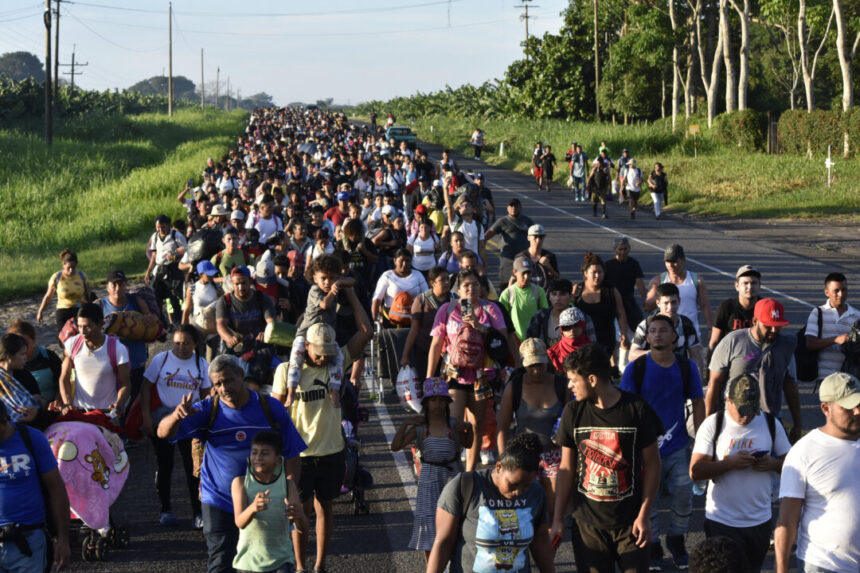Commentary
During a conversation with a friend about the migrant crisis in the United States, an interesting observation was made. Many prosperous Western nations are currently facing similar issues. They are dealing with an influx of migrants that are straining the system, causing frustration among citizens, creating financial burdens, disrupting public order, and potentially leading to political instability.
One intriguing question that arises is why, after many years of localized migrant problems linked to border conflicts or other disruptions, so many nations are now simultaneously grappling with overwhelming numbers of people taking advantage of broken migration systems. How did a local issue escalate to a global crisis so rapidly? How did border controls worldwide fail at the same time?
Looking back at the previous challenge, we witnessed a global response to the COVID-19 pandemic. Most countries implemented similar policies such as mask mandates, social distancing measures, business closures, travel restrictions, and capacity limits. This uniform approach, unprecedented in modern times, was adopted by nearly all nations except for a few like Sweden, Tanzania, and Nicaragua, which faced criticism from the international media.
While migration and pandemic planning are just two examples, they both highlight a concerning reality. The traditional nation-state model, which has been dominant since the Renaissance and even earlier, is giving way to a new form of governance known as globalism. This shift does not just involve cross-border trade, which has been common throughout history, but entails a transfer of political control from individual countries to a higher authority that citizens have limited influence over.
Since the Treaty of Westphalia in 1648, the concept of state sovereignty has governed politics. Not all nations needed to adopt identical policies; they could coexist while respecting differences to maintain peace. This arrangement allowed for religious diversity among nations, leading to the expansion of freedom in various aspects. While this system functioned, not everyone was satisfied with it.
Throughout history, some of the most brilliant minds have envisioned global government as a solution to the differing policies of nation-states. This idea appeals to scientists and ethicists who strongly believe in their solutions and advocate for a worldwide implementation of their preferred approach. However, humanity has largely refrained from such drastic measures beyond forming military alliances and improving trade relationships.
In the 21st century, we have witnessed a rise in the influence of globalist institutions. Organizations like the World Health Organization, global foundations, and NGOs have played significant roles in pandemic responses and migrant crises. Institutions such as the International Monetary Fund, World Bank, and World Trade Organization have exerted substantial control over monetary, financial, and trade policies, diminishing the authority of individual nations.
During a recent visit to New York City coinciding with a United Nations meeting, it was evident that global forces were converging. Diplomats, financial giants, media conglomerates, prominent universities, and nonprofits gathered for the event, signaling a collective desire to shape the future. This future appears to be one of global governance, where the nation-state’s power is gradually reduced to a symbolic entity with limited operational authority.
The atmosphere at the United Nations meeting highlighted a stark divide between the attendees, who seemed detached from the concerns of ordinary citizens and the nation-state itself. These individuals, often referred to as “bubble people,” operate in a world separate from the majority, with their social circles, financial backing, career aspirations, and influence disconnected from national boundaries. Their prevailing attitude dismisses the significance of the nation-state and its historical significance.
The entrenched globalism of the 21st century represents a departure from the governance structure that has prevailed for centuries. Previously, governance was organized around geographically defined zones of authority, with juridical boundaries limiting the exercise of power. While expansion required conquest or colonialism, these arrangements were temporary as they ultimately depended on the consent of the governed. The principle of consent gained prominence in political affairs from the 18th century onwards, leading to the establishment of the nation-state model where citizens held ultimate sovereignty over their governments.
The United States, initially formed as a collection of localized democracies under a loose confederation, eventually unified into a single nation-state where citizens wielded sovereign power over their governance. This shift towards nation-states marked a significant development in political history, emphasizing the consent of the governed as the foundation of legitimate authority.
The Articles of Confederation did not establish a central government, instead leaving governance up to the individual states. The Constitution, however, sought to create a system of checks and balances to limit the power of the national government while safeguarding state rights.
The democratic ideal revolves around citizens having the final say in how their government is structured, ensuring freedom as its core principle. Today, there are forces opposing this ideal, advocating for global institutions to supersede national sovereignty in addressing various global challenges.
It is crucial to recognize that undermining the nation-state model also undermines democracy and freedom. Empowering global institutions at the expense of citizen control leads to disenfranchisement and allows elites to dominate global governance.
Reclaiming national sovereignty is essential to prevent universal disenfranchisement and maintain citizen control over governance. Decentralizing power from centralized institutions is key to upholding the principles of freedom and democracy envisioned by historical figures like Thomas Jefferson.
The views expressed in this article are the author’s opinions and do not necessarily reflect those of The Epoch Times.
Source link







